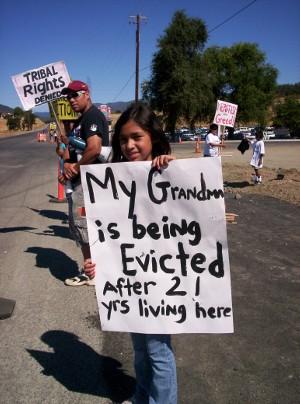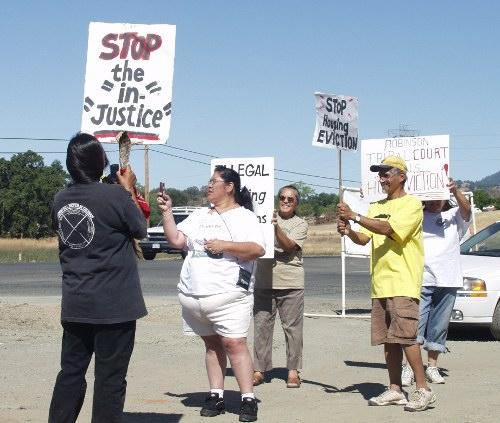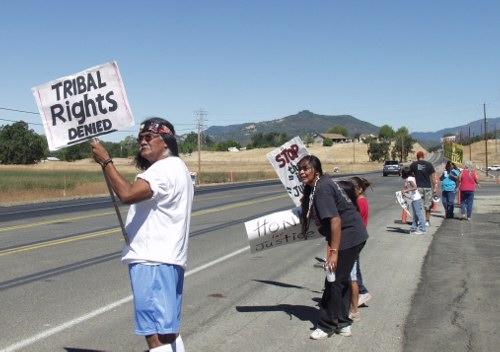
NICE – Tensions between the Robinson Rancheria Citizens Business Council and a group of tribal members the council is trying to remove from tribal membership is continuing to mount, and culminated in another protest at the casino's entrance on Saturday.
The Saturday rally is in response to a round of evictions under way by the tribe's housing committee.
About 30 people carried signs and walked along the edge of Highway 20 at Robinson's entrance. Sign slogans ranged from “Robinson Rancheria court equals housing eviction,” “Illegal housing evictions and fraud,” “Stop tribal council fraud,” “Lies, cheat, steal, “Honk for justice,” “Tribal rights denied,” “Nepotism and greed” and “My grandma is being evicted after 21 years living here.”
Over the three hours the group protested Saturday, they received numerous honks and gestures of support from passersby. One couple from out of the area stopped by to ask about the protest and what was happening.
Last December, following months of controversy over a disputed election, the Robinson Rancheria Citizens Business Council – headed by Tribal Chair Tracey Avila – passed disenrollment resolutions on 63 tribal members, according to recently released documents.
The council also disenrolled an additional three tribal members for lack of blood quantum – the amount of blood a person is supposed to have to quality for tribal membership.
Before taking the disenrollment votes on those 66 tribal members, the council also unanimously voted to disenroll Marie Boggs Quitiquit, who had by that time been dead for several years. The votes to disenroll her children and grandchildren, part of the large Quitiquit family totaling more than 30 members, then followed.
Marie Quitiquit's daughter, Wanda Quitiquit, is currently leading the disenrollment appeal effort to the Bureau of Indian Affairs, which has granted numerous delays in the process since the start of the year. Next month, the final appeals are due, and a BIA decision on whether the disenrollments were valid is expected to take place.
A previous protest by those who were disenrolled by the council and those who supported the disenrollees' case was held in front of the casino on Jan. 17, as Lake County News has reported.
That same month, the tribe's housing committee began efforts to evict several of those whose names were on the disenrollment list from homes built on the rancheria with federal Housing and Urban Development funds.
HUD officials have confirmed to Lake County News that they issued findings in February that found the tribe was not in compliance with the guidelines of its federal housing grants. The tribe could be forced to repay its grants – the amount was not disclosed – it it refuses to take corrective actions.
Those facing eviction include Inez Sands, who is raising her grandchildren in a five bedroom home that protesters on Saturday said already is being measured for new tile and carpet for new occupants. She received a three-day quit letter in January but has refused to give up her home.
Another person targeted for eviction is Karen Ramos, who was told she needed to come up with $4,000 in back mortgage payments for face eviction, according to her daughter, Tonia Ramos.
While many of those slated for eviction owe back mortgages, tribal member EJ Crandell – whose disputed win over Avila for tribal chair last year appeared to set the disenrollments in motion – said owing back mortgage payments was common among all tribal members, even the council, after the tribe took over its own housing agreements after severing ties with Northern Circle Indian Housing Authority in Ukiah.
Lake County court records show that Avila also had been sued by Northern Circle at one point over housing issues several years ago, which were resolved.
The current housing committee includes members of the Anderson family, to which Avila belongs also. Committee members include Judy Anderson, Michelle Monlo, Diane Boggs, Deborah Anderson and Audrey Gutierrez.
Crandell, whose grandfather is a part of the leadership for the Hopland Band of Pomo Indians, said Robinson's tribal council attempted to have Hopland's tribal court handle 11 eviction cases, but Hopland turned down that request.
At one point Saturday morning Gutierrez showed up and confronted the protesters, using a cell phone to photograph and record the encounter. The protesters yelled questions at her, asking her which house she was going to get after the evictions were carried out.
Another election was held Saturday, Aug. 22, with the top vote getters being Curtis Anderson and Clayton Duncan. A runoff election is due to be held, although Crandell said there were concerns that the election was being invalidated, just as the election in which he beat Avila last year was overturned.
The election is having other ramifications for some tribal members. Tonia Ramos said her husband, a longtime Robinson Rancheria casino employee, abstained from voting in the tribal election, as is his normal practice. The result this time: The tribe suspended him pending an administrative hearing in which he faces losing his job.
Crandell's mother also has been threatened with eviction action.
E-mail Elizabeth Larson at This email address is being protected from spambots. You need JavaScript enabled to view it. . Follow Lake County News on Twitter at http://twitter.com/LakeCoNews .

